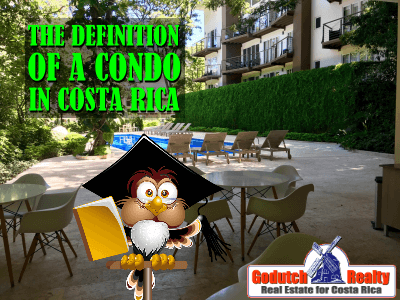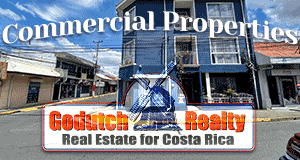Estimated Reading Time: 7 Minutes
What is the definition of a condo in Costa Rica? To many, it’s not very clear. However, we have a wide selection of condominiums for sale. Therefore, I invite you to learn more about them.
In other countries, a condominium is often something different than it is in Costa Rica. Some call it a condo or a condominium. Others call it a flat, an apartment, a co-op, a loft, or a townhouse.
Therefore, I think it’s time to explain.
If you are ready to move to Costa Rica and planning to buy a condo, you should know what a condo is.
Formally Organized
A condo in Costa Rica registers as a “Condominio” in the National Register. Therefore, you will be able to find each property well described in the constitution of this condominium. The constitution defines the common areas, the bylaws, the administrator, and other important condominium information.
So if you want the full information before buying a condo in Costa Rica, you should pull this constitution (this can run up to over 50 pages) from the National Register.
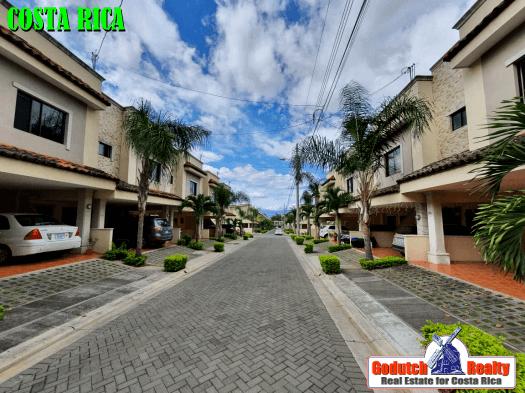
Condominium in Costa Rica?
A condo in Costa Rica or “Condominio” is a property officially registered in the National Register of Costa Rica. This property is either subdivided in different manners:
- Homesites or building lots, called officially Horizontal Condominium
- Townhomes or townhouses, called officially Horizontal Condominium
- Condo apartments of one or several buildings of several stories, called officially Vertical Condominium. Some US citizens call a condo only an apartment when it is for rent. In some other places, they call it either one. However, many realtors do call it a highrise condo. So, to make it easy, I will call it just a condo.
Homesites
Are you planning to purchase a home site or a building lot in a condominium? Then, probably each lot is registered as an individual, private area and is a percentage of the total size of the community. Streets are probably paved, and there will be sidewalks. The gate is controlled by a 24-hour guard in a guard shack with a bathroom. The community will have its sewer system and maybe a pool, a playground, and other amenities.
All those belong to the common areas and are maintained by an HOA fee that each owner will pay. The size of the private area usually regulates HOA fees. So larger lots pay more HOA fees than smaller lots. The size of the house doesn’t have anything to do with the HOA amount to be paid; what’s important is the lot size.
Many communities like this only allow for a particular construction style (such as colonial, for example). In addition, the construction plans have to be approved by a construction committee, besides the standard municipal and code regulations.
Bylaws always indicate what residents can do and what not. These bylaws include information about having pets when to stop the parties, reserve the pool area, and other condo restrictions.
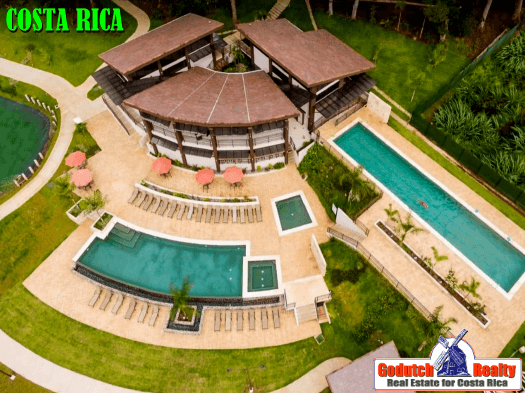
Townhouses
A condominium with townhouses, or townhomes, is usually all built by the real estate developer. All houses are generally the same, although I’ve seen a few with 2 or 3 sizes. The community is also on its sewer (and sometimes a water backup system). And there are also amenities most of the time, such as a pool.
If you love being around kids, lots of them, this is the place to live. You’ll see small bikes and toys in every carport, and you’ll see kids all over the common area. Mom and dad are used to the fact that their kids are loud and noisy. You might not be.
You’ll find communities with townhouses of all sizes and prices. But usually, these are starter homes. So, if you are retiring, a condo in Costa Rica, with rows of townhouses, once stuck to the other, is possibly not for you.
Condo Apartments
You’ll find vertical condos in higher-density areas, although there are also unique high-end condo apartments like a mansion. They are always located in a building(s) and share common areas, water treatment plants, sewers, pools, and other amenities.
Most condos in a building have ample space between floors, so there won’t be any noise from those living above you. But check before you buy. You might not like the high heels your neighbor uses.
Typically rules include residents having pets or not and hanging laundry from the balcony.
The latest fashion is to have a condo in a mixed zoning area with a more urban lifestyle than elsewhere. Access to groceries and restaurants is becoming more and more critical. Something to seriously check on is the parking space that belongs to this condo.
Learn why some .
Gated Community
A gated community is not a legal term in Costa Rica, but a condominium is. Therefore, all condominiums are gated communities. But not all gated communities are a condominium in Costa Rica.
A real gated community has a guarded gate at the entrance. These guards will control access. Besides, there is a wall or fence all around the community. AND the community has formal bylaws or CC & R’s.
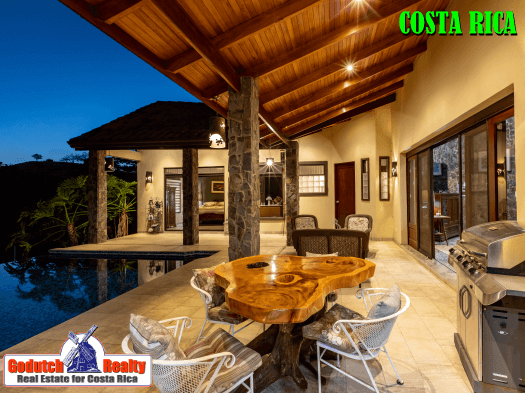
Agrarian Community
Mostly in rural and beach areas, you’ll find one of those agricultural communities or “parcelas agricolas.” This model allowed developers to subdivide a farm meant for agricultural use into 5,000 or 7,000 m2 lots.
Officially, the city allows for only one house on each lot (for the farmer to live in). But generally, the city regulations allow for one home + guesthouse or “casita“ + pool. So you’ll find those communities typically in locations such as Atenas, Grecia, Puriscal, and the mountains close to the beach.
Ask your lawyer to check the legality of the bylaws that the developers of this type of communities created.
This type of gated community usually only has a “gate” but not more than a barbwire fence around the community.
Survey Maps
The developer had to subdivide the condominium into a certain amount of condos/lots in all three options. Therefore each apartment, building lot, or townhouse has to have its survey. The survey will always show the whole community and will point out the particular condo/lot.
In my next blog, I’ll tell you more about the pros and cons of buying in a condominium

